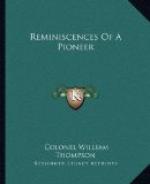The first weeks of our journey were passed without anything happening worthy of note. At Caw river we were detained several days by high water. Here we began falling in with others, who, like, ourselves, were bound for the golden shores of the Pacific. And it was here that we made the acquaintance of families, and friendships formed that were to survive not only the privations of the plains but were to last a life time. Men were drawn together on the plains as in the everyday walks of life, only the bonds were closer and far more enduring. The very dangers through which they passed together rendered the ties more lasting. “Our train” henceforth consisted of my father’s, Littleton Younger, John Gant, “Uncle” Johnny Thompson and a party of five Welsh gentlemen, under the leadership of a gentleman named Fathergill, and a prince of a gentleman he was. At that time there was not a cabin in what is now the great and populous State of Kansas. Only vast undulating plains, waving with grass, traversed here and there with timberskirted streams. Game was abundant, consisting mostly of antelope and prairie chickens. Our Welsh friends, being bachelors and having no loose stock, were the hunters for the train, and supplied us with an abundance of fresh meat.
As we proceeded westward more immigrants were met, and often our camp resembled a tented city. All was then a pleasure trip—a picnic, as it were. No sooner was camp struck than a place was cleared and dancing began to the sound of the violin. Many of these young ladies were well dressed—actually wore “store clothes!” But alas, and alack, I was destined to see these same young ladies who started out so gay and care-free, in tattered dresses, barefooted and dusty, walking and driving the loose cattle. Too many excursions and pleasure jaunts had reduced their horses to skeletons before the real trials of the journey had fairly begun. But the women of ’52 and ’53 were not of the namby-pamby sort. When the trials came they were brave and faced privations and dangers with the same fortitude as their stronger brothers.
At Fort Laramie we crossed the Platte river by fording. The stream, as I remember it, was near a mile wide, but not waist deep. Thirty and forty oxen were hitched to one wagon, to effect the crossing. But woe to the hapless team that stalled in the treacherous quicksands. They must be kept going, as it required but a short stop for the treacherous sands to engulf team and wagon alike. Men wading on either side of the string of oxen kept them moving, and soon all were safely on the north side of the Platte river.
We soon began to see great herds of buffalo. In fact, at times the hills were black with the heaving, rolling, bellowing mass, and no meal was served for many days without fresh buffalo. As we wended our way up the valley of the Platte one could look back for miles and miles on a line of wagons, the sinuous line with vari-colored wagon covers resembling a great serpent crawling and wriggling up the valley. Fortunately for “our train” we were well in advance and thus escaped the sickness that later dotted the valley of the Platte with graves.




